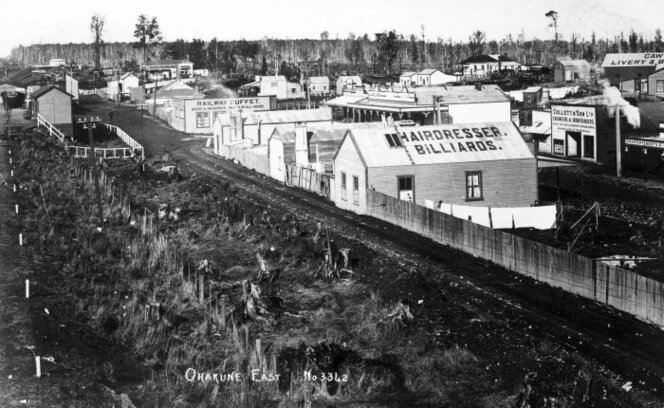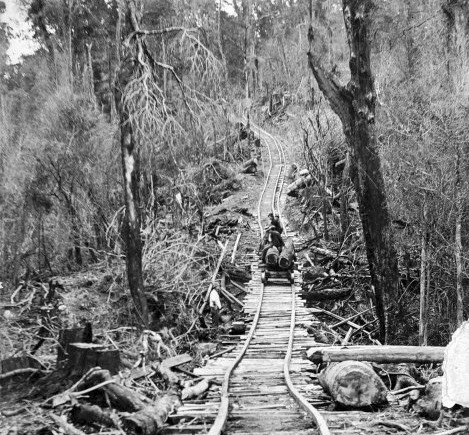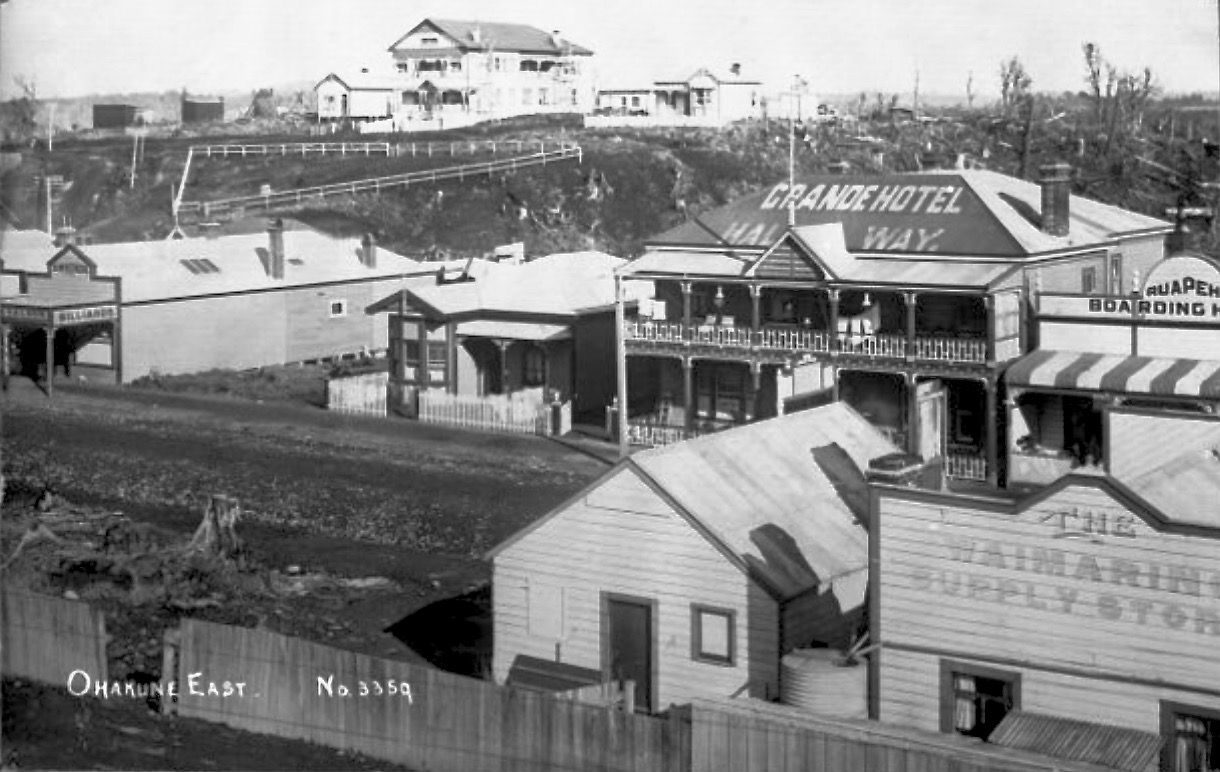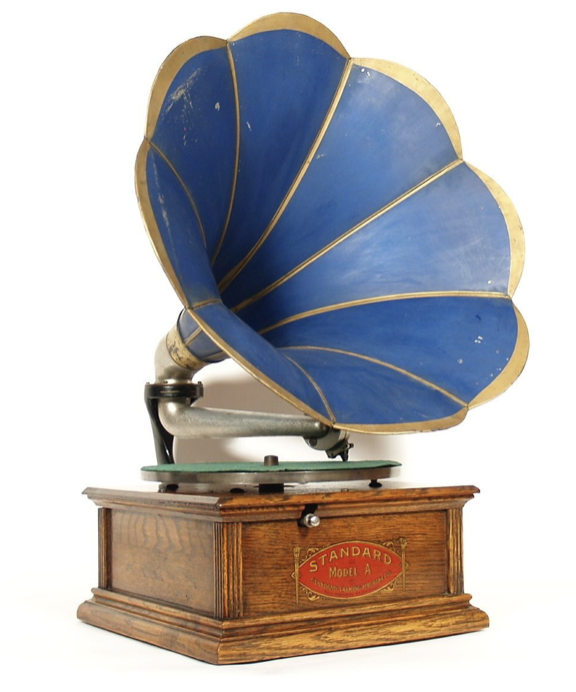Kiwi songs - Maori songs -
Home
This is a good example of a
topical ballad used to recall
a significant event in a district and to honour those
who
who were the heroes of the event.
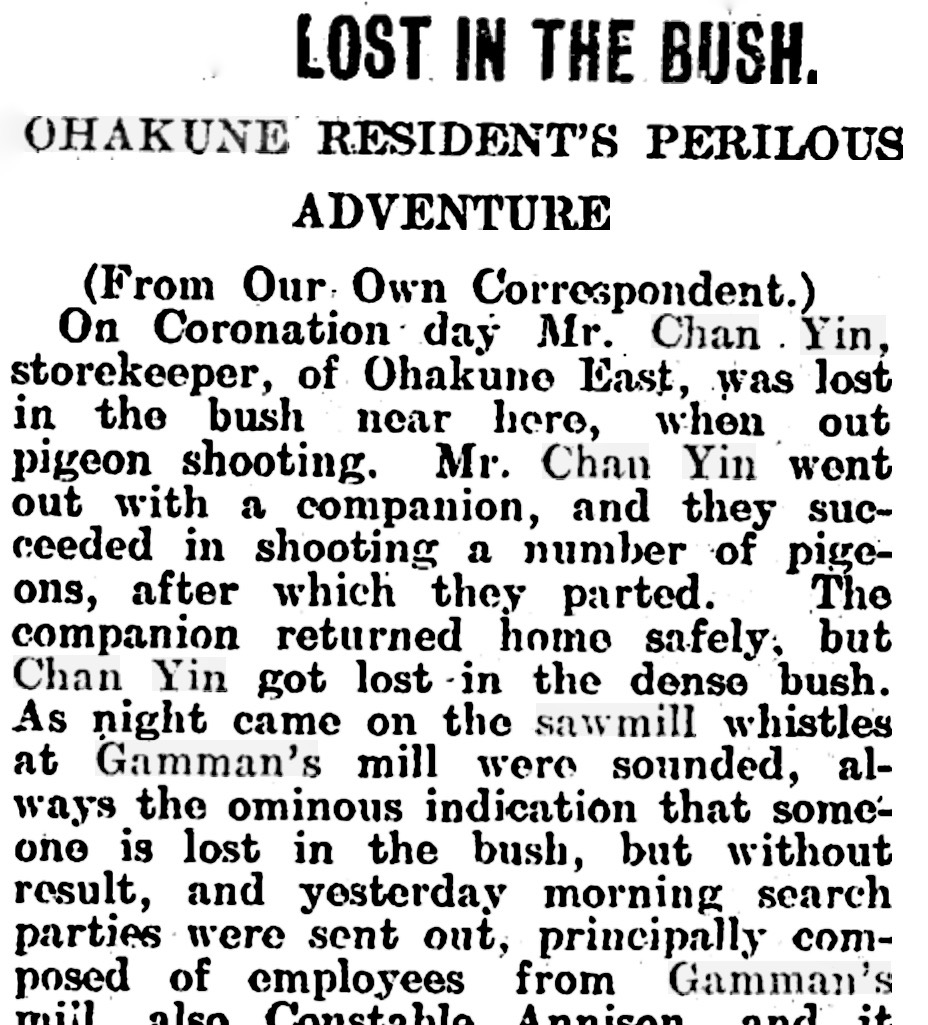
|
Bush life is
rather quiet to the working class at
least,
and we don't get much sensation down at Ohakune
East.
But our peace was badly fractured on the 29th of
June,
For the news had come upon us like the burst of a
balloon
That the Chinamen went shooting when the ground was
white with frost
Had somehow got separated, and that poor old Chan
was lost;
Ohakune
East is now called "The Junction." On the day of
King George V’s coronation at Westminster Abbey, the
29th June, 1911, a Chinese storekeeper and his
nephew went hunting pigeons in the snow-covered
forest below today's Old Coach Road. 40-year-old
Chan Yin ran a grocery store for the timber and
railway workers, and his nephew, 22-year-old Tommy
Chan, managed Chan Yin's billiards saloon.
So
the bushmen got their rifles, and they put
their oilskins on
And invited every one they met to come and look for
John.
And a huge crowd soon assembled to take part in the
search,
And they started on this mission amid rimu, pine
and birch;
Rifles
were for signaling. "Oilskins"were raincoats,
leggings and rainhats made from canvas covered
in linseed oil. "John Chinaman" was the
colonists' terms for any Chinese man.
"Pine" was kahikatea, "birch" was southern beech
or tawhai.
Some were used to open
country, some at home within the bush,
While others would be better firing cannons off
the cush.
...they spent most of their time bouncing
balls off the cushions of the tables in Chan's
billiards saloon.
But
the Benbows and Bill Tucker knowing every leaf and
bough,
Utilised both mind and muscle to locate the missing
Chow.
And the public speculated that 'twould be one of
those three
Who'd return before the sun went down with the
popular Chinee.
They found where poor Chan spent the night, the
fresh prints of his feet
And the silver off some chocolates which was all he
had to eat;
They shouted out and cooee-ed, then they listened
for reply,
But the lost one did not hear them, though he must
have been close by
With whistles, guns and shouting, they made a
dreadful din,
But with all their search and signals they could not
locate Chan Yin.
The night was fast approaching with their searching
all in vain,
So each one found himself compelled to start for
home again;
But some three or four sat chatting on Gamman's
loco' line,
Telling yarns to one another, regardless of the
time.
It seems an act of providence that they remained so
late,
For all were of the opinion that poor Chan had met
his fate.
Gamman's Timber Mill was located across the river
from the Ohakune Railway Station, and then
downstream.
Gamman's locomotive line
ran up into the forest below the Old Coach Road.
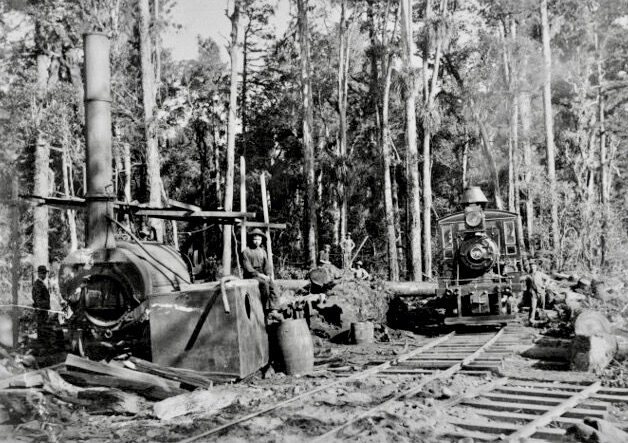
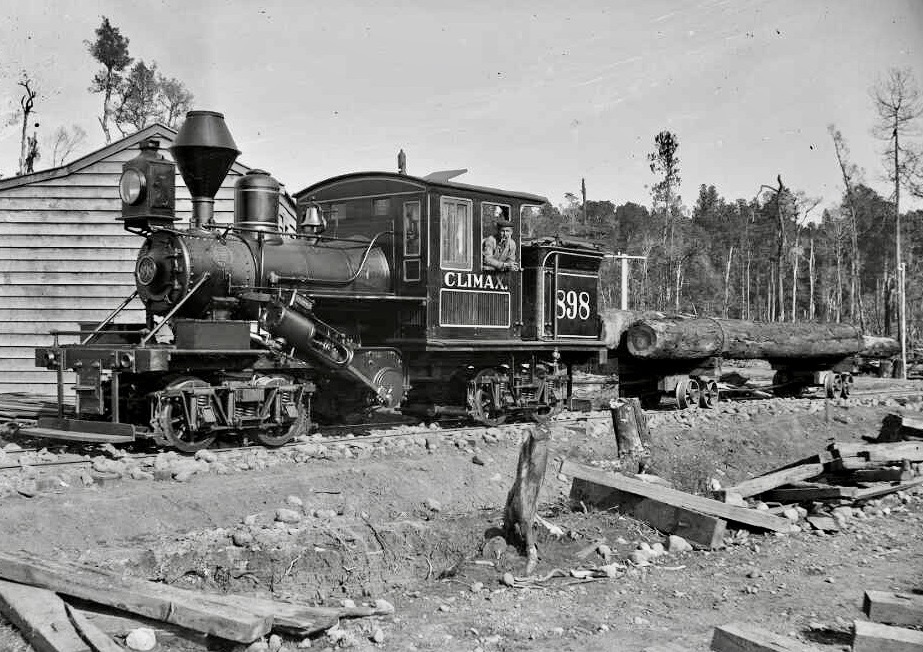
They heard a distant gun-shot and cooee-ed in reply,
Then they listened for a moment, and they heard a
faint Al-i.
Then through bungas, logs and bushes, they
hurried to the place
And found him almost frozen with a smile upon his
face.
He had one boot off and one boot on, and hadn't much
to say.
He had thrown his rifle, and his birds, and
cartridges away.
Bungas
are tree ferns, today called pungas by Pakeha, and
ponga by Maori. Down south on the West Coast,
bushmen called them bungee trees.
They took the wet and muddy clothes all off the frozen
man,
And took their own clothes off their backs and put
them on to Chan;
And I'm proud that I am living in a district where we
can
Find someone who'll take off their clothes to warm
their fellow man; 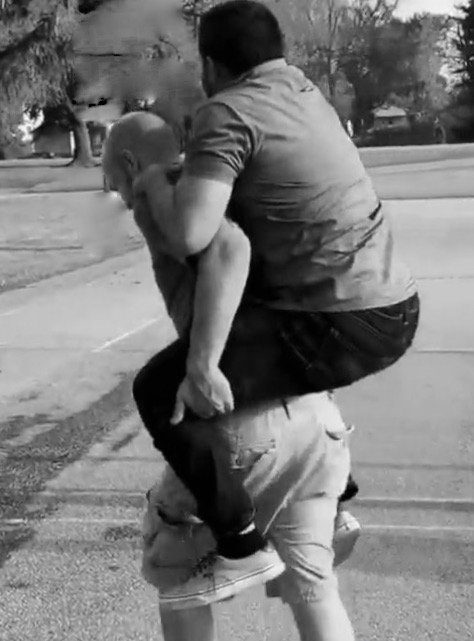
Then each one there in turn helped to "piggy-back" him
home,
and tried to cheer and comfort the subject of this
poem.
They saddled up George Arnott and Chan Yin
took his seat,
And he said that Arnott's paces would be very
hard to beat;
Then they put him on to Flannel and then the fun
began,
He did his best to pig-jump, but he couldn't
throw old Chan
Who rode him rather reckless through the
thistles, logs and burrs,
And I'm sure a record would be broke if Chan had had
his spurs.
Then Peddar put him on his back, and started with his
load,
And Chan Yin sat him like a bird, from there out to
the road.
He stuck to everyone in turn, and quite enjoyed the
ride,
He said Jim Blackburn's very rough when altering
his stride;
Alf Kay shyed rather badly at the sight of
Gamman's shed,
But he made the pace a cracker when Chan gave him
his head;
These are all
horse-riding terms. They pretended to be "horsies"
to raise his spirits and to warm him up.
Here is Gamman's millling shed.
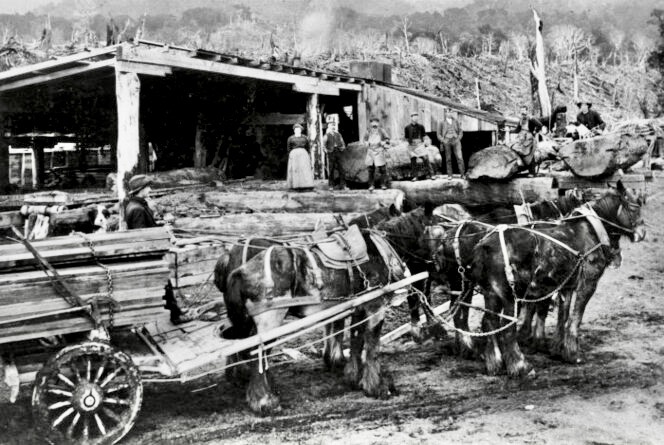
They told him that he'd
soon be home and there be put to rights,
And he looked as if he needed it, as we faced the
station lights;
Then they asked him if he savvied Charlie Fisher's
big hotel
And I think if Chan could answer, he would say, "not
very well!"
But they carried him on quickly, and his pulse was
beating wild,
As they carried him inside at last, to his anxious
wife and child.
Charlie
Fisher's big hotel, the Grande Hotel, is now Turoa
Lodge.
Chan Yin ran the Waimarino Supply Store bottom
right.
Tommy Chan managed the billiards parlour left.
The neighbours got a
basin, and they first washed off the mud
Then they rubbed his limbs and body for to circulate
the blood.
They gave him food and brandy; they put him in his
bed;
And they heaped the blankets on him, but he lay there
like the dead
(Had he spent another evening where the pines and
pigeons grow
He would now be over yonder, where we all must some
day go).
The
pinecones of our southern pines or podocarps -
kahikatea, rimu, totara etc - evolved to lose the
scales over their seeds while at the same time their
centre stalk became juicy. These 'berries' were food
for the pigeons that also ate the seeds and thus
spread the trees.
Then they gave a few
directions for attention by-and-bye,
And Missus Chan Yin answered each instruction with
Al-i.
He kept his bed for quite a time, and had many an ache
and pain
'Ere he could rise and venture out, to use his limbs
again;
He spoke of his adventures to his children and his
wife,
And was grateful to the searchers whom he knew had
saved his life;
He offered a reward to those who found him I've been
told,
And they only joked the matter off, and would not take
his gold;
But he said he was determined their kindness to repay,
He'd give a banquet to his friends, the following
Saturday.
He hired the Gamman Employees' Hall, just opposite the
mill
And sent us invitation cards to come and have our
fill.
Gamman's
milling shed on on the left, Employees Hall on the
right.
George &
Bill Gamman employed about 90 workers.
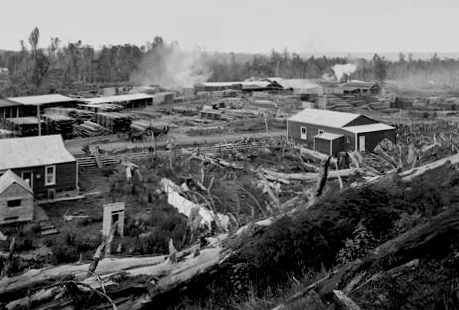
And some seventy or eighty responded to his call,
And the tables creaked with good things as we stepped
inside the hall.
There were many nationalities, well represented there,
Ana we started operations with Ritchie in the chair.
He said our host was glad to see so many smiling faces
And invited every mother's son to kindly take their
places;
So we slackened out our belts a hole, and each one
took his chair,
And you talk about a supper; well, I'll tell you what
was there:
There were sandwiches and cigarettes, and current
buns, and beer,
Queen cakes, sponge and pound cakes, and lollies too;
oh dear!
You should have seen the sausage rolls, I fancy still
I can,
And bottles of Scotch whisky, for to drink the health
of Chan,
There were oranges and apples and bananas there that
night,
And the soft drinks that he turned on, I tell you were
alright;
There were dainties there, I'm sure, to suit the
palate of each man
Some say that Chinamen are mean - you can't say that
of Chan.
Then Ritchie honoured new King George, the
Ruler over all,
And the boys with flowing glasses, soon responded to
his call.
We sang the National Anthem that we'd often
sung before,
And we raised our glasses empty, and held them out for
more.
King
George V - he had been newly crowned the day Chan
got lost.
The national
anthem was God Save the King. God Defend NZ did not
become our national anthem until 1979.
While the waiters
charged our glasses, which took a brace of shakes,
We also made a murderous charge upon the sandwiches
and cakes.
A guest then rose to sing a song amidst a loud
applause,
And he got a good reception from the crowd of wagging
jaws;
Then
someone soon proposed the health of Chan our
smiling host,
And with the din of cheering it beat King George's
toast;
We stood with flowing glasses of whisky,
beer and gin,
I heard a clink of glasses, and a chorus of "Chan
Yin"
When I heard a general gurgle and then a stamp of
feet,
Then I knew it all was over, and again I took my
seat!
Then someone sang another song, it was "English
Bill," I think;
Then each lit up a cigarette, and had another drink.
Then we drank the health of Benbows, and the
searchers one and all;
In fact we drank the health of those who never
searched at all!
And the speakers were quite jolly as they gave their
short address,
And we drank to local industries, the Town Board and
the Press;
Then our host got up and thanked those (in a few but
grateful words)
Who had brought about his rescue when lost out
shooting birds,
And we were glad that we had snatched him from Jordan's
golden brink
So we cheered him in chorus; then we had another
drink.
The
old Christian metaphor for death was to leave the
harsh Arabian desert and cross the River Jordan
into the paradise of the fertile Jordan Valley.
We had songs and recitations, clog-dances and
break-downs
And it beat the comic operas which I've seen in bigger
towns.
A phonograph was switched on, and announced a
song, I think,
When the singer was invited to "come and have a
drink!"
A
phonograph was a mechanical record player powered by
a wind-up spring.
We sang of Jacob's
Ladder and the Old Bridge by the Mill,
While some danced Maori hakas - you could not keep us
still;
Some spoke of their relations, who were rolling in
great wealth,
and of course we had to listen, or perhaps to drink
their health.
But each one had a good time, and as we strolled away,
We all felt that we would like to find old Chan Yin
every day.
I've tried to do this into verse; I've done the best I
can,
and wind up now with
GOOD LUCK TO CHAN YIN THE CHINAMAN.
- JAMES HYNDES
Samuel Gamman
- was born in Kent, England, in 1831. He gained
experience in engineering as a corporal in the Royal
Engineers. He emigrated to New Zealand in 1859, and
set up a timber milling operations at Oxford, near
Christchurch. In 1879 he went bankrupt and built a new
mill at Bunnythorpe, near Palmerston Nth and went
bankrupt again in 1886. Undeterred he set up again at
Dannevirke and prospered.
Samuel's sons, George and William Gammon,
and ... Simmons, trading as G A Gammon &
Co opened a timber mill at Foxton and in
1894 bought a schooner to carry their timber to
Australia. In 1900 they supplied 500 cubic metres of
timber to Sydney.
When the North Island Main Trunk line was completed in
1908, they built a mill at Ohakune, across the river
from where the OCR Cafe is today. The mill could
produce more than 100 cubic metres a day, and included
George Gamman's patented new planing plant for making
tongue and groove boards. Many of the mill
hands, including James Hyndes, had worked at the
Gamman mill near Dannivirke, where Chan Yin & Co
had opened a store 3 years previously.
The Ohakune mill was destroyed by fire in April 1913,
putting 90 men out of work. Many found work
road-building.
Chan Chek Yin
- was born in Jung Seng County, Guangdong,
in 1870. After arriving
in Wellington in 1896, he began opening
fruit, vegetable and grocery stores, including a
grocery store in Dannivirke in 1906, then moved
to Ohakune in 1909, bought land
at Ohakune Junction and opened another store
there. Six months after Chan Yin was rescued, his
Ohakune store burnt down. But he had insured it and
was able to rebuild. The store burnt down again in
1930.
He brought several members of his family out from
China to work for him, including his nephew Tommy
Chan. Eventually there were Chan
Yin stores in most of the surrounding
districts,
including Rangataua, Pokaka, Horopito and Raetihi.
He moved back to Hong Kong around 1937 but
sadly was caught there by the Japanese invasion
in 1941 and suffered badly as a result,
dying in Hong Kong in 1943, aged 73.
James Hyndes
-was a tally clerk who had previously worked for
the Gammon company in Dannivirke. A well-educated man,
he served on the Ohakune School Committee.
|
'The Lost Chinaman' with no comments
Bush life is rather quiet
to the working class at least,
and we don't get much sensation down at Ohakune East.
But our peace was badly fractured on the 29th of June,
For the news had come upon us like the burst of a
balloon
That the Chinaman went shooting when the ground was
white with frost
Had somehow got separated, and that poor old Chan was
lost;
So the bushmen got their rifles, and they put their
oilskins on
And invited every one they met to come and look for
John.
And a huge crowd soon assembled to take part in the
search,
And they started on this mission amid rimu, pine and
birch;
Some were used to open country, some at home within the
bush,
While others would be better firing cannons off the
cush.
But the Benbows and Bill Tucker knowing every leaf and
bough,
Utilised both mind and muscle to locate the missing
Chow.
And the public speculated that 'twould be one of those
three
Who'd return before the sun went down with the popular
Chinee.
They found where poor Chan spent the night, the fresh
prints of his feet
And the silver off some chocolates which was all he had
to eat;
They shouted out and cooee-ed, then they listened for
reply,
But the lost one did not hear them, though he must have
been close by
With whistles, guns and shouting, they made a dreadful
din,
But with all their search and signals they could not
locate Chan Yin.
The night was fast approaching with their searching all
in vain,
So each one found himself compelled to start for home
again;
But some three or four sat chatting on Gammon's loco'
line,
Telling yarns to one another, regardless of the time.
It seems an act of providence that they remained so
late,
For all were of the opinion that poor Chan had met his
fate.
They heard a distant gun-shot and cooee-ed in reply,
Then they listened for a moment, and they heard a faint
Al-i.
Then through bungas, logs and bushes, they hurried to
the place
And found him almost frozen with a smile upon his face.
He had one boot off and one boot on, and hadn't much to
say .
He had thrown his rifle, and his birds, and cartridges
away.
They took the wet and muddy clothes all off the frozen
man,
And took their own clothes off their backs and put them
on to Chan;
And I'm proud that I am living in a district where we
can
Find someone who'll take off their clothes to warm their
fellow man;
Then each one there in turn helped to "piggy-back"' him
home,
and tried to cheer and comfort the subject of this poem.
They saddled up George Arnott and Chan Yin took his
seat,
And he said that Arnott's paces would be very hard to
beat;
Then they put him on to Flannel and then the fun began,
He did his best to pig-jump, but he couldn't throw old
Chan
Who rode him rather reckless through the thistles, logs
and burrs,
And I'm sure a record would be broke if Chan had had his
spurs.
Then Peddar put him on his back, and started with his
load,
And Chan Yin sat him like a bird, from there out to the
road.
He stuck to everyone in turn, and quite enjoyed the
ride,
He said Jim Blackburn's very rough when altering his
stride;
Alf Kay shyed rather badly at the sight of Gamman's
shed,
But he made the pace a cracker when Chan gave him his
head;
They told him that he'd soon be home and there be put to
rights,
And he looked as if he needed it, as we faced the
station lights;
Then they asked him if he savvied Charlie Fisher's big
hotel
And I think if Chan could answer, he would say, "not
very well!"
But they carried him on quickly, and his pulse was
beating wild,
As they carried him inside at last, to his anxious wife
and child.
The neighbours got a basin, and they first washed off
the mud
Then they rubbed his limbs and body for to circulate the
blood.
They gave him food and brandy; they put him in his bed;
And they heaped the blankets on him, but he lay there
like the dead
(Had he spent another evening where the pines and
pidgeons grow
He would now be over yonder, where we all must some day
go).
Then they gave a few directions for attention
by-and-bye,
And Missus Chan Yin answered each instruction with Al-i.
He kept his bed for quite a time, and had many an ache
and pain
'Ere he could rise and venture out, to use his limbs
again;
He spoke of his adventures to his children and his wife,
And was grateful to the searchers whom he knew had saved
his life;
He offered a reward to those who found him I've been
told,
And they only joked the matter off, and would not take
his gold;
But he said he was determined their kindness to repay,
He'd give a banquet to his friends, the following
Saturday.
He hired the Gamman Employees' Hall, just opposite the
mill
And sent us invitation cards to come and have our fill.
And some seventy or eighty responded to his call,
And the tables creaked with good things as we stepped
inside the hall.
There were many nationalities, well represented there,
Ana we started operations with Ritchie in the chair.
He said our host was glad to see so many smiling faces
And invited every mother's son to kindly take their
places;
So we slackened out our belts a hole, and each one took
his chair,
And you talk about a supper; well, I'll tell you what
was there:
There were sandwiches and cigarettes, and current buns,
and beer,
Queen cakes, sponge and pound cakes, and lollies too; oh
dear!
You should have seen the sausage rolls, I fancy still I
can,
Ana bottles of Scotch whisky, for to drink the health of
Chan,
There were oranges and apples and bananas there that
night,
And the soft drinks that he turned on, I tell you were
alright;
There were dainties there, I'm sure, to suit the palate
of each man
Still some say Chinamen are mean - you can't say that of
Chan.
Then Ritchie honoured new King George, the Ruler over
all,
And the boys with flowing glasses, soon responded to his
call.
We sang the National Anthem that we'd often sung
before,;
And we raised our glasses empty, and held them out for
more.
While the waiters charged our glasses, which took a
brace of shakes,
We also made a murderous charge upon the sandwiches and
cakes.
A guest then rose to sing a song amidst a loud applause,
And he got a good reception from the crowd of wagging
jaws;
Then someone soon proposed the health of Chan our
smiling host,
And with the din of cheering it beat King George's
toast;
We stood with flowing glasses of whisky, beer and gin,
I heard a clink of glasses, and a chorus of "Chan Yin"
Then I heard a general gurgle and then a stamp of feet,
Then I knew it all was over, and again I took my seat!
Then someone sang another song, it was "English Bill," I
think;
Then each lit up a cigarette, and had another drink.
Then we drank the health of Benbows, and the searchers
one and all;
In fact we drank the health of those who never searched
at all!
And the speakers were quite jolly as they gave their
short address,
And we drank to local industries, the Town Board and the
Press;
Then our host got up and thanked those (in a few but
grateful words)
Who had brought about his rescue when lost out shooting
birds,
And we were glad that we had snatched him from Jordan's
golden brink
So we cheered him in chorus; then we had another drink.
We had songs and recitations, clog-dances and
break-downs
And it beat the comic operas which I've seen in bigger
towns.
A phonograph was switched on, and announced a song, I
think,
When the singer was invited to "come and have a drink!"
We sang of Jacob's Ladder and the Old Bridge by the
Mill,
While some danced Maori hakas - you could not keep us
still;
Some spoke of their relations, who were rolling in great
wealth,
and of course we had to listen, or perhaps to drink
their health.
But each one had a good time, and as we strolled away,
We all felt that we would like to find old Chan Yin
every day.
I've tried to do this into verse; I've done the best I
can,
and wind up now with
GOOD LUCK TO CHAN YIN THE CHINAMAN.
- JAMES
HYNES
|
Maori
songs - Kiwi songs - Home
This
page was put onto folksong.org.nz website February 2021
|

